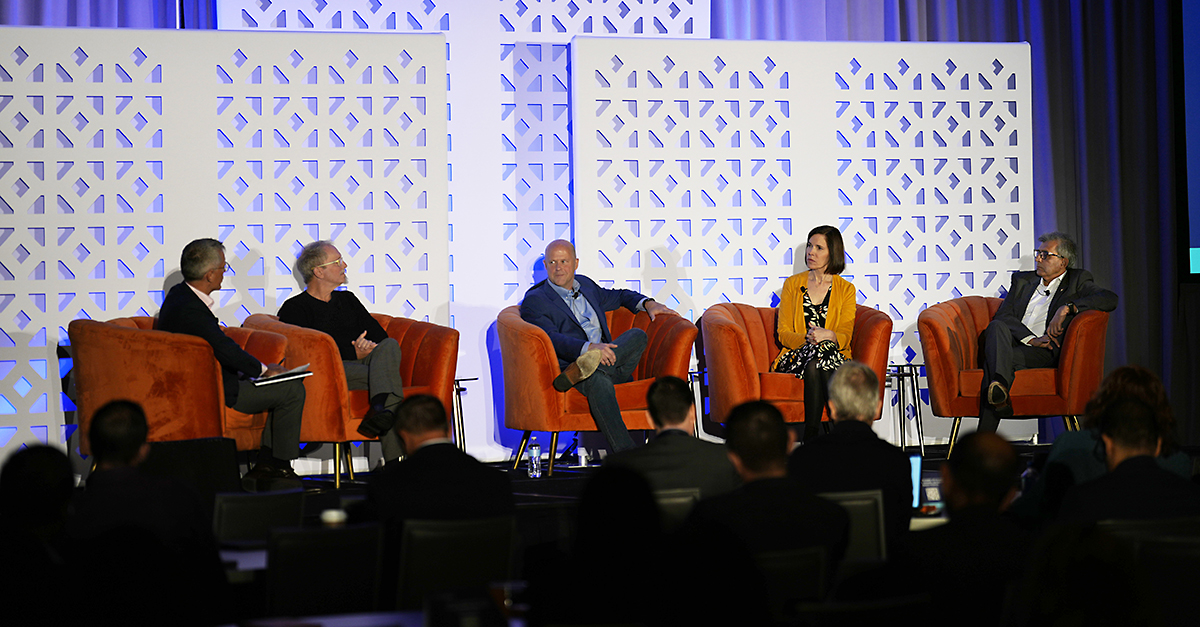More than 150 leaders representing 70 global consumer products enterprises convened in Chicago this month. Their aim? To collectively address common challenges and develop shared solutions to propel the industry forward.
At a time when simultaneous forces are putting unprecedented pressure on the Consumer Packaged Goods (CPG) and Food & Beverage (F&B) industries - from lingering impacts from the pandemic, to nimble, disruptive new market entrants, to talent and sustainability challenges - it's clear that functions across these enterprises need to evolve fast to retain their competitive advantage.
Pulling insights from over 30 speakers across 10 sessions and workshops, read on to learn what participants planned to bring back to their organizations to drive better business outcomes, enhance their reputations, and stay ahead of their competition.
Digital Business Transformation: How Consumer Goods Enterprises Can Prepare for the AI Age
“What do you uniquely know about your customers, and how do you leverage that to win at the moment of truth?”
The Summit kicked off with a rousing interactive masterclass led by digital transformation expert Prof. Venkat Venkatraman. Through his presentation and workshop, participants heard how digital business transformation is shifting competitive forces across industries at unprecedented scope and speed.
He offered guidance on how to anticipate the impact of both “digital giants” and nimble digitally-native new market entrants encroaching on or disrupting consumer products enterprises. Prof. Venkatraman also shared principles for maximizing the participants’ inherent advantages in these new market dynamics.
The masterclass participants also discussed how new technological developments like Artificial Intelligence (AI) are likely to impact their industry and organizations. Competitors and partners alike workshopped business “experiment” ideas that participants could pitch to their respective leadership teams to drive learnings and break free from outdated ways of thinking.
The concept of digital business transformation carried through in the next day’s Summit keynotes and panels. Research & Development (R&D), supply chain, quality, regulatory, and food safety leaders all discussed how their functions have been impacted by market and supply chain volatility, new technologies, and how they’re setting themselves up for sustainable success.
While most speakers acknowledged the valuable potential of AI and other emerging technologies, they admitted they still have a long way to go to achieve their digital business transformation visions. As one session moderator noted, very few CPG companies have the foundation of structured data in place to actually use AI or even to automate basic processes. “Everyone wants to drive the Ferrari but nobody wants to build the road.” Charting a path towards their digital business future, beginning with this strong foundation, was seen as an essential leadership mandate across functions.
Moving the Dial from Compliance to Compassion: Taking a Holistic View in a Transformative Era
No global consumer products enterprise today operates independently. They are subject to regulations and standards from a multitude of jurisdictions and regulatory bodies. Their operational models include tiers of suppliers that impact consumer experiences - often influencing whether a product helps realize brand promises or damages consumer trust. These dynamics force leaders across areas like R&D, supply chain, quality, regulatory, and food safety to look outward to achieve their business goals and live true to their stated culture.
Looking externally, multiple speakers referenced the importance of investing in developing value chain partners, and helping them move towards more sustainable and compliant practices. From Unilever’s intricate multi-tiered global supply chain, to Jollibee’s diverse network of downstream partners and ingredient suppliers, to Philip Morris International’s global community of tobacco farmers, manufacturers and brands are stepping up to empower their value chains with training and reskilling support. Actions like these were recognized as vital to maintaining supply chain stability and resiliency, in addition to an opportunity to reflect corporate values.
Putting People at the Center: Talent and Change Management’s Importance in All Initiatives
While technology was a key element to many conversations at the Summit, there was explicit acknowledgement that it should not be viewed as a silver bullet. After all, the best systems and tools are meaningless if your people don’t understand why and how they’re supposed to use them.
This theme popped up in various ways across multiple sessions, including attracting and retaining the right talent, reskilling workers for a more digital workplace, and engaging people across the organization in change management efforts.
Beginning with the R&D leaders panel, we heard several impressive examples of ways organizations such as The Clorox Company, Campbell’s Soup Company, Estée Lauder, and PepsiCo are engaging diverse teams to drive product innovation. From focusing on creating experiences for employees at all levels, to “makers fair” type competitions, to bringing diverse perspectives into the innovation pipeline earlier, it was clear that yesterday’s more traditional R&D methods were quickly being left behind.
Surprisingly, multiple speakers agreed that buying new technology is actually the easy part of digital business transformation. What remains most challenging is making sure that people are also changing how they work and how they make decisions. Across sessions, numerous speakers spoke to the importance of having a clear, leader-driven vision and rationale for changing how work is done, and emphasizing things like simplified processes or systems consolidation when communicating how changes will impact employees day to day experiences.
Driving the Consumer Products Industry Forward, Together
In this uniquely disruptive time for the consumer products industry, it will take market leaders and their technology partners working together to maintain consumer trust and bring safe, high-quality, sustainable offerings to the market with speed.
The Veeva Consumer Products Executive Summit was an unprecedented opportunity for industry leaders to connect, learn from each other, and share their perspectives and ideas. The event marked a significant milestone in the industry's journey towards digital business transformation. It demonstrated how new strategies, combined with modern technology, can be leveraged to enable smarter R&D, enhance sustainability efforts, improve supply chain accountability and efficiency, and drive overall better business outcomes.
Want to learn more? Subscribe below to be informed as on-demand session recordings become available in the coming weeks.
SHARE





